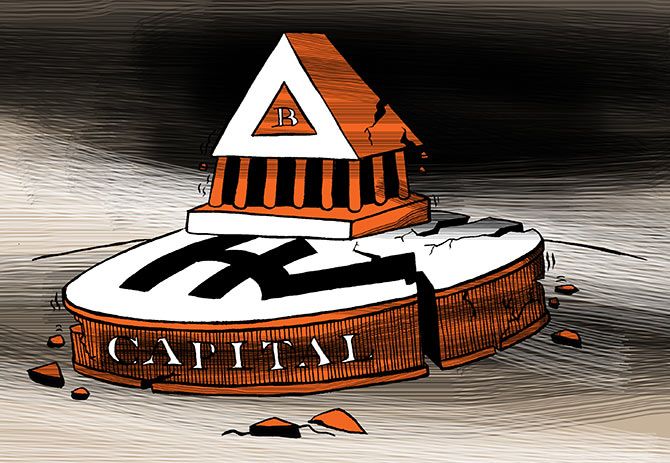'Under the floating rate system, when interest rates go up, banks are quick to increase rates, but when interest rates drop, they are reluctant to pass on the decline.
'It was this that the RBI tried to fix with the circular -- and that too under pressure from New Delhi.
'In doing so, it may end up creating a different mess,' says Debashis Basu.
Illustration: Uttam Ghosh/Rediff.com

What happens when policymakers do the right thing for the wrong reasons?
The outcome may turn out to be good owing to sheer luck, but more likely they are setting the stage for some unpleasant, unintended consequences.
This is what may happen as the fallout of the September 4 circular of the Reserve Bank of India (RBI).
Beginning October 1 this year banks will have to link the interest rates on such loans to a known external benchmark, instead of using their own opaque internal benchmarks.
This is good news for consumers, not because their loans will become cheaper.
From now on, banks must allow old borrowers to shift to this system, putting old and new borrowers at par.
For 20 years, the RBI has allowed banks to inflict unfair, opaque, and discriminatory practices on borrowers.
Banks know little about new borrowers but charged them less than their existing borrowers, who, by the way, diligently repay loans with interest month after month, and banks knew all about their good behaviour.
Allowing both new and old borrowers to have their loans linked to the external benchmark ends this discrimination. But no one is highlighting this.
The reason is that the RBI did not necessarily act to end discrimination and bring about fairness and transparency.
It only acted to “improve (the) transmission” of rates, an important political objective of any government.
The most popular recipe for economic growth has been cutting interest rates.
Every finance minister demands it.
Under the floating rate system, when interest rates go up, banks are quick to increase rates, but when interest rates drop, they are reluctant to pass on the decline.
It was this that the RBI tried to fix with the circular -- and that too under pressure from New Delhi.
In doing so, it may end up creating a different mess.
A short history of transmission
The RBI has supported this unfair system for almost 20 years.
We had the prime lending rate (PLR) in 1994 and the benchmark PLR in April 2003, neither of which produced “adequate" monetary transmission.
"This defeated the very purpose for which these benchmarks were introduced”, found the RBI.
Even when it knew that banks were manipulating unworkable internal benchmarks, seven years later, the RBI again made a half-hearted attempt to introduce another internal benchmark, the “base rate”.
Expectedly, this too failed to ensure transmission.
In 2016, there was one more experiment -- the marginal cost of funds-based lending rate (MCLR).
The idea was that the transmission of the effects of rate changes to borrowers would be swift because marginal rates of deposits would move up and down in line with the RBI repo rate.
But the MCLR too was an internal benchmark and hence there was no transmission.
Moneylife Foundation last year filed a PIL (public interest litigation) petition in the Supreme Court to end the discrimination.
The court directed the RBI to respond.
On December 5, under Urjit Patel, the RBI finally announced an external benchmark -- 20 years late.
Patel left soon after and the new governor quickly junked this move. It was business as usual for banks.
Unfortunately for banks, economic growth has tanked and the government is desperately looking for ways to fix things.
While politicians and businessmen don’t see eye to eye on anything during a slowdown, the one thing they all agree on is that cutting interest rates would spur growth.
The inflation rate is now low and the RBI is cutting rates, but there is still no transmission.
The reason for this is obvious, something that the RBI had refused to implement for two decades: Introducing an external benchmark.
While previous finance ministers huffed and puffed about banks’ resistance and did nothing, this government is made of sterner stuff.
They cut the Gordian knot and ordered banks to use an external benchmark.
Unintended consequences
While the move is good for consumers, will it lead to some other mess?
First, is the repo rate the right benchmark?
Many floating-rate loans, like home loans, are for 15 years.
These loans should be linked to a long-term external benchmark rate, which the RBI should have developed first.
Banks argue that the RBI shouldn’t be forcing them to link long-term loans to a highly volatile short-term benchmark like the repo rate.
Banks have been allowed to change their rates once a quarter.
Second, banks have been claiming that since the liability side is not floating, they do not have the flexibility for transmission.
To protect themselves, banks have immediately started linking savings account rates to the external benchmark.
This will, in turn, confuse and drive away savers from banks.
The third messy aspect is that external benchmarks are applicable only to banks and not to finance companies.
But they have a large market share and anyway charge more than banks.
The right course of action would have been to address all these issues systematically.
The RBI had more than a decade to think through the problem.
But it couldn’t care less. The ministry ranted about transmission after every rate cut but didn’t ask for a thoughtful solution.
And banks were happy to manipulate their internal benchmarks to fleece borrowers.
So when the government cracked down on poor transmission this time, the RBI quickly took the path of least resistance.
Banks and the RBI will now have to deal with more serious consequences as highlighted above, but then they have brought this upon themselves.
Debashis Basu is the editor of www.moneylife.in











